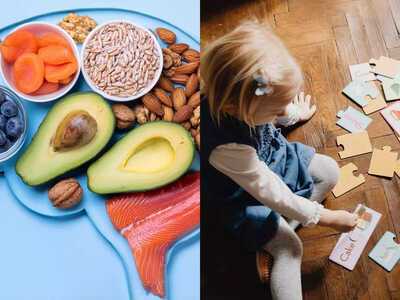Children’s brain development is a complex process fueled by essential nutrients that support cognitive growth, memory, attention, and overall neurological function. Optimal nutrition during early years plays a pivotal role in shaping their intellectual abilities and behavior. Here are 7 foods, from soaked almonds to banana honey, that significantly contribute to the healthy growth and brain development of children.
Soaked Almonds
Almonds are rich in healthy fats, vitamin E, magnesium, and antioxidants. Soaking them makes nutrients more bioavailable and easier to digest. Vitamin E helps protect brain cells from oxidative damage, while magnesium supports nerve function and memory. Their protein content also supports overall brain cell structure.
Bananas with Honey
Bananas provide essential carbohydrates for energy, along with vitamin B6, potassium, and dietary fiber. Honey adds natural sugars that provide quick energy. Vitamin B6 aids neurotransmitter production critical for brain function, while potassium regulates nerve signals and muscle contractions.
Eggs
Eggs are a powerhouse of brain nutrients, including choline, vitamin B12, and high-quality protein. Choline is vital for synthesizing acetylcholine, a neurotransmitter involved in memory and learning, while vitamin B12 supports nerve cell maintenance and cognitive development.
Leafy Green Vegetables
Spinach, kale, and other leafy greens provide folate, iron, and antioxidants. Folate is crucial for DNA synthesis and brain cell growth, while iron supports oxygen transport to the brain. Antioxidants help protect brain cells from oxidative stress.
Yogurt
Yogurt is rich in protein, calcium, zinc, and probiotics. Calcium and zinc contribute to brain growth and neurotransmitter synthesis, while probiotics promote gut health, which recent studies link to better cognitive function through the gut-brain axis.
Nuts and Seeds
These provide healthy fats, protein, and zinc important for brain cell membrane formation and signaling. Zinc deficiency has been associated with impaired memory and learning.

Fish and Seafood
Especially oily fish like salmon are rich in omega-3 fatty acids DHA and EPA, essential for neuron structure and function. They also contain iodine and vitamin D, vital for neurodevelopment.
Why these foods are good for brain health
These brain-friendly foods supply key nutrients like choline, DHA, folate, iron, zinc, vitamins B6, B12, and E, antioxidants, and healthy fats. Together, they support synaptogenesis, neurotransmitter production, neuronal growth, myelination, and protection against oxidative damage.

According to a 2023 study reported that home-based nutrition focused on these key nutrients enhanced cognitive development in children, emphasizing the significance of quality food access during formative years. Nutritional interventions rich in protein, iron, folate, and omega-3 fatty acids have demonstrated improvements in memory, attention, and overall neurodevelopment, highlighting the critical role of these foods in brain growth. Including these nutrient-dense foods in children’s diets helps build a strong foundation for lifelong brain health, improved learning abilities, and emotional well-being, making early nutrition a cornerstone of optimal childhood development.
Soaked Almonds
Almonds are rich in healthy fats, vitamin E, magnesium, and antioxidants. Soaking them makes nutrients more bioavailable and easier to digest. Vitamin E helps protect brain cells from oxidative damage, while magnesium supports nerve function and memory. Their protein content also supports overall brain cell structure.
Bananas with Honey
Bananas provide essential carbohydrates for energy, along with vitamin B6, potassium, and dietary fiber. Honey adds natural sugars that provide quick energy. Vitamin B6 aids neurotransmitter production critical for brain function, while potassium regulates nerve signals and muscle contractions.
Eggs
Eggs are a powerhouse of brain nutrients, including choline, vitamin B12, and high-quality protein. Choline is vital for synthesizing acetylcholine, a neurotransmitter involved in memory and learning, while vitamin B12 supports nerve cell maintenance and cognitive development.
Leafy Green Vegetables
Spinach, kale, and other leafy greens provide folate, iron, and antioxidants. Folate is crucial for DNA synthesis and brain cell growth, while iron supports oxygen transport to the brain. Antioxidants help protect brain cells from oxidative stress.
Yogurt
Yogurt is rich in protein, calcium, zinc, and probiotics. Calcium and zinc contribute to brain growth and neurotransmitter synthesis, while probiotics promote gut health, which recent studies link to better cognitive function through the gut-brain axis.
Nuts and Seeds
These provide healthy fats, protein, and zinc important for brain cell membrane formation and signaling. Zinc deficiency has been associated with impaired memory and learning.

Fish and Seafood
Especially oily fish like salmon are rich in omega-3 fatty acids DHA and EPA, essential for neuron structure and function. They also contain iodine and vitamin D, vital for neurodevelopment.
Why these foods are good for brain health
These brain-friendly foods supply key nutrients like choline, DHA, folate, iron, zinc, vitamins B6, B12, and E, antioxidants, and healthy fats. Together, they support synaptogenesis, neurotransmitter production, neuronal growth, myelination, and protection against oxidative damage.
According to a 2023 study reported that home-based nutrition focused on these key nutrients enhanced cognitive development in children, emphasizing the significance of quality food access during formative years. Nutritional interventions rich in protein, iron, folate, and omega-3 fatty acids have demonstrated improvements in memory, attention, and overall neurodevelopment, highlighting the critical role of these foods in brain growth. Including these nutrient-dense foods in children’s diets helps build a strong foundation for lifelong brain health, improved learning abilities, and emotional well-being, making early nutrition a cornerstone of optimal childhood development.
You may also like

CCPA slaps Rs 8 lakh fine each on Dikshant IAS, Abhimanu IAS over misleading ads

West Bengal Police to tie up with AI to curb crimes in state

MCA Announces Rs 40 Lakh Cash Prize For Senior Women's T20 Trophy Winning Side

52 Students fell ill due to suspected food poisoning at BC residential Boys School in Telangana's Gadwal

Bihar: Two SHOs suspended in Dularchand Yadav murder case in Mokama






